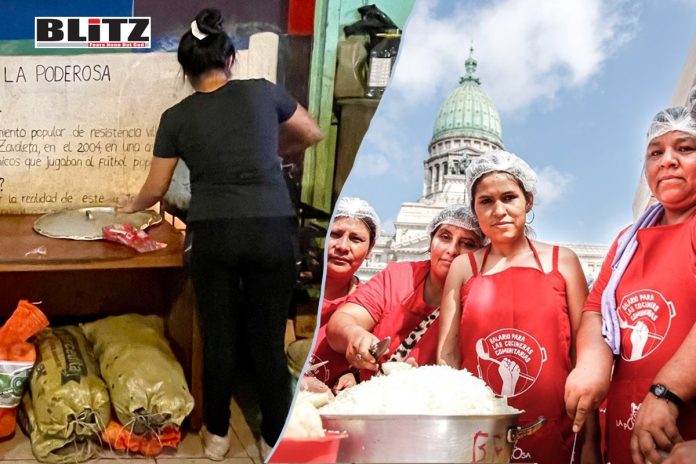In the heart of Buenos Aires, Alicia Casimiro oversees a community kitchen in Villa 31, a vibrant yet underserved neighborhood juxtaposed against the city’s affluent districts. Here, amid the grandeur of nearby Recoleta, Casimiro and her team grapple with dwindling supplies, struggling to meet the growing demand for meals. “Many families come to the soup kitchens”, she explains. “Also unemployed people who weren’t coming before. There are elders, pregnant women, and many children”.
Similar challenges echo across Argentina, as Griselda Burgueño, running a soup kitchen in Gregorio de Laferrère, shares her concerns about scarce bread supplies, leaving many families hungry. These community kitchens, affectionately termed ‘common pots’ or ‘ollas populares,’ are a lifeline for over ten million people in Argentina, cooked by the hands of 140,000 dedicated women.
However, recent months have brought unbearable strains on these community kitchens. The government’s austerity measures, enacted under President Javier Milei’s administration, slashed essential food distributions to these kitchens, exacerbating an already dire situation. Sandra Pettovello, the Minister of Human Capital, alleged “extortion” within some soup kitchen groups, further complicating matters.
In response, María Claudia Albornoz of La Poderosa, a prominent slum dwellers’ movement, questions the government’s stance, asking, “Why does the government make enemies out of us cooks?” La Poderosa, organizing since 2004, manages 158 community kitchens nationwide, including one in Villa 31. Yet, despite the challenges, these women persevere, driven by a shared commitment to their communities.
Villa 31, with its rich history tracing back to the 1930s, is a microcosm of Argentina’s socio-economic disparities. Today, it is home to over 40,000 residents, a stark contrast to the neighboring opulence of Recoleta. Yet, despite the challenges, the spirit of resilience thrives, embodied by the 11 cooks at the ‘Gustavo Cortiñas’ soup kitchen, named after a young activist who disappeared during Argentina’s military dictatorship.
Pooling their resources, these women began organizing in 2016, driven by a common purpose to combat hunger and support their communities. Despite juggling multiple responsibilities, including domestic work and casual jobs, they dedicate six to eight hours a day to cooking and serving meals. Yet, even these efforts are not enough to alleviate the growing food insecurity exacerbated by economic hardships.
The impact of poverty reverberates throughout Argentina’s slums, where families grapple with overcrowded living conditions, inadequate infrastructure, and chronic food shortages. Women, comprising three-quarters of household heads in these communities, bear the brunt of these hardships, yet they stand at the forefront of resilience and collective action.
Against this backdrop of adversity, community kitchens serve as more than just food distribution centers; they are hubs of emotional support, solidarity, and resistance against social injustices. In a country where nearly 57% of the population lives in poverty, and with food inflation soaring, these kitchens represent a beacon of hope amidst despair.
Yet, despite the daunting challenges, women like María Zárateu and Antonia Cáceres persevere, embodying the resilience of Argentina’s marginalized communities. “We women are sustaining the neighborhoods in a very difficult way”, remarks Albornoz. “We are very tired, exhausted, but we can still organize ourselves”.
In the face of adversity, Argentina’s community cooks stand as a testament to the power of collective action, resilience, and solidarity. As they continue to navigate the complexities of poverty and food insecurity, their unwavering commitment to their communities shines brightly, offering a glimmer of hope in Argentina’s darkest hours.




